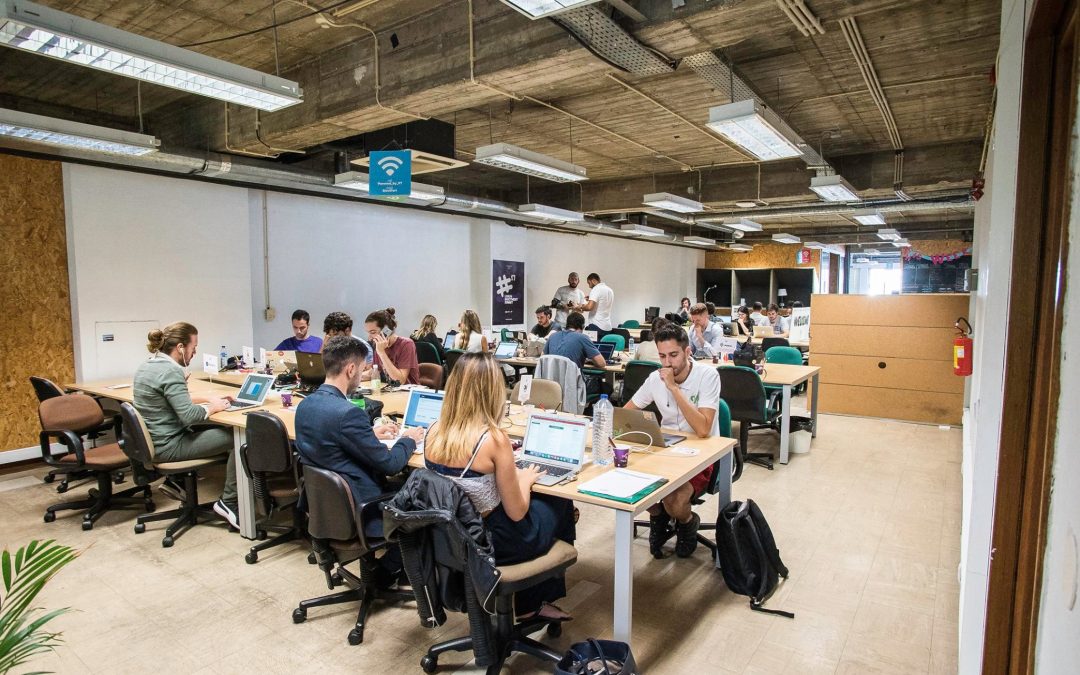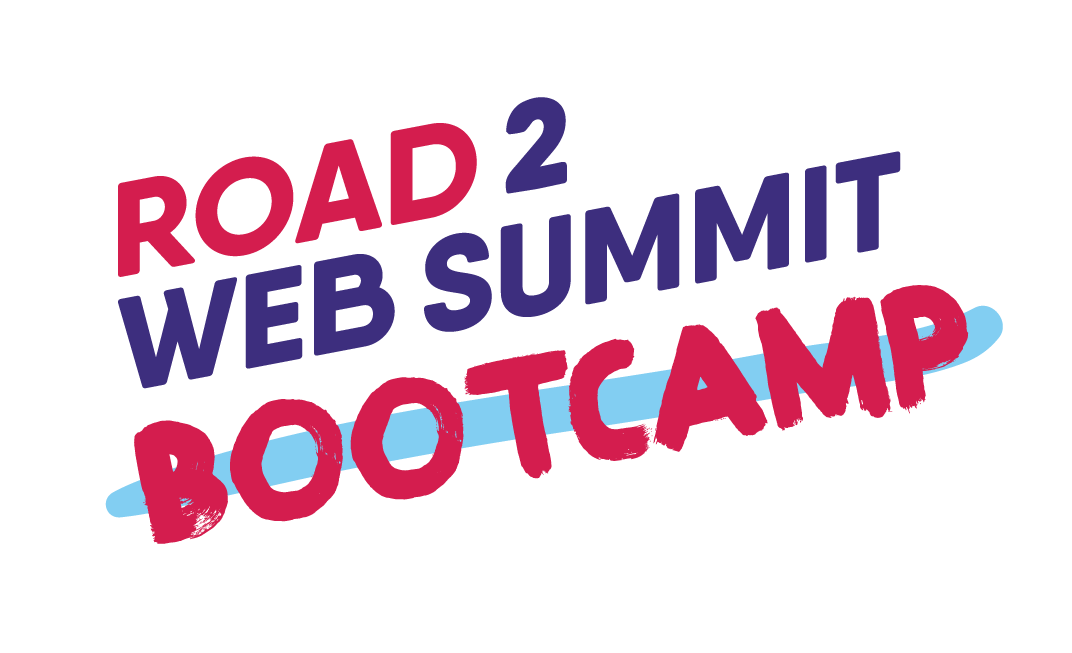
by Alisson Avila | Sep 18, 2019 | Corporates, Investors, Startups
Also AWS Chief Evangelist, he praised Feedzai and many other startups while sharing his vision on cloud computing
On September 11, we had the pleasure of hosting Jeff Barr, VP and Chief Evangelist from Amazon Web Services (AWS), at Beta-i headquarters. Our hub was the place for a special AWS Lisbon User Group talk led by Barr, and also open to our clients, about the major transformations of digital business brought about by cloud solutions.
This was an opportunity for Beta-i customers and the community to enjoy a moment of knowledge exchange and interaction with one of the leading corporate names in the digital economy, right at the moment that AWS invests in Portugal through a support office and a new Amazon CloudFront location. Owner of a very active blog, Barr gave this exclusive interview to Beta-i via email as he continued his ongoing worldwide sessions.
Your talk here in Lisbon summarizes the “double shift” of digital transformation provided by cloud computing: “from simply centralized computing and storage, operated on an on-demand, pay-as-you-go basis, to the industry-wide locus of innovation, host to a multitude of services”. What is AWS’s vision and ambition to take the lead in this gigantic universe?
Our vision is always the same: focus on customers and innovate on their behalf. To date, AWS has millions of active customers every month and the reasons why customers are turning to AWS is because it has a lot more functionality, the largest and most vibrant community of customers and partners, the most proven operational and security expertise, and the business is innovating at a faster clip – especially in new areas such as Machine Learning and Artificial Intelligence, Internet of Things, and Serverless Computing.
That being said, there is another reason why customers are choosing AWS: customers have come to really appreciate that the AWS culture is really different. If a startup, enterprise, or government agency is going to partner with a cloud provider, it’s typically a long-term decision they’re making, and they really want to understand what’s unique about the culture, or the partner that they are choosing. As a matter of fact, 90% of what we build is driven by what customers tell us matters, and the other 10% are things we hear from customers where they may not articulate exactly what they want, but we try to read between the lines and invent on their behalf.
We’re also trying to build relationships and a business that lasts longer than all of us in this room. And you do that by doing right by customers over a long period of time. An example that ties this all together is a capability in our support function called AWS Trusted Advisor. We’ll look at customers’ utilization of our resources, and if they’re low or idle, we’ll reach out to them and say, maybe you don’t want to spend this money right now. Over the last couple of years, we’ve used AWS Trusted Advisor to tell customers how to spend less money with us, leading to hundreds of millions of dollars in savings for our customers every year.
In your experience, does physical proximity still increase the number of business leads and connections? For how long?
We look at physical proximity as a way for our teams to better help our customers and support them in their cloud journey. In fact, our decision to invest in Portugal last year by opening an AWS office in Lisbon is in direct response to our Portuguese customers’ requests and our determination to support them in an even better way. It also follows many years of supporting a growing customer base in the country with their cloud adoption. AWS counts some of Portugal’s fastest-growing and most well-known businesses as customers including, Energias de Portugal, Feedzai, Federação Portuguesa de Futebol, Globalvia, Grupo Impresa, Jumia, Lusiaves, Miniclip, Prodsmart, OutSystems, Unbabel, and Uniplaces, as well as Public Sector organisations such as the City of Cascais and the City of Porto. We have seen there is a real appetite from organisations across Portugal looking to get started with AWS in order to innovate, lower their IT costs, and grow their organisations around the world.
More recently on September 5, 2019, we continued our investment in the country by launching a new Amazon CloudFront location. This new Edge location will offer all organizations in the country faster content delivery and added cybersecurity protection. Located in Lisbon, the new Edge location brings the full suite of services provided by Amazon CloudFront, including integration with computing, networking, and security services like AWS Lambda@Edge, Amazon Route53, Amazon S3 Transfer Acceleration, AWS Shield, and AWS Web Application Firewall (WAF).
We look forward to fostering the country’s pioneering spirit alongside our customers and helping them accelerate their digital transformation and deliver innovative new products and services.
Is it possible to assess the first repercussions of AWS CloudFront Point of Presence (PoP) set up in Portugal, or is it still too early?
AWS is committed to investing in Portugal and similar to our office opening, the launch of the first Amazon CloudFront location in Portugal follows feedback of our customers, so reception is very positive. Adding this Amazon CloudFront Edge location will help Portuguese organizations achieve lower latency while delivering the same levels of security that they have come to expect from AWS Cloud, ultimately resulting in a better overall experience for their end-users.
How would you describe AWS’s relationship with startups today? Which preferred model does Amazon use to connect to new external solutions?
Startups in Portugal and around the globe turn to AWS so they can innovate faster. They can focus their highly valuable resources on developing and marketing applications that differentiate their business and transform customer experiences instead of the undifferentiated heavy lifting of managing infrastructure and data centres. Because startups can very quickly develop and roll out new applications, it means they can experiment and innovate more quickly and frequently and if an experiment fails, they can always de-provision those resources without risk.
You only need to look at the number of successful startups from Portugal, such as Miniclip, Feedzai, Unibabel, Uniplaces, and Prodsmart who have launched their businesses globally. These customers are using AWS to drive innovation, accelerate time to market, and expand their businesses. For many years AWS has been supporting the Portuguese startup and technology community by bringing programs like AWS Activate to the country. AWS Activate provides startups with the resources they need to get started on AWS – including up to $100,000 (USD) in credits, training, support, as well as contact with incubators, accelerators and venture capital firms, such as Beta-i. Tens of thousands of startups take advantage of these benefits each year. In 2018, more than $500 million in AWS credits were given to help startups accelerate their growth and development as they build their businesses.
Which startups / new projects have caught your attention recently, and why?
One particular startup in Portugal that caught my eye is Feedzai. Feedzai is a Lisbon-based startup that detects financial fraud at scale. The company uses real-time machine learning & artificial intelligence AWS’s services such as Amazon Sagemaker to analyze transactions data through deep historical and behavioural analysis to identify fraudulent payment transactions and minimize risk in the financial industry. With more than 5 billion dollars of transactions processed daily, Feedzai enables major financial institutions worldwide (such as Lloyd’s Bank) to fight fraud effectively.
Earlier this week I was in Barcelona and was able to spend time with several fast-growing startups including Letgo, an online marketplace. They have been using AWS for over four years to support their rapid growth. I was impressed by their microservices architecture, and their ability to make use of a very wide variety of AWS services, including Amazon SageMaker and other machine learning services. One thing that I find interesting about this and other startups in the area is that the AWS cloud helps them to address global markets, regardless of the physical location of the company.
AWS’s re/Start project is a welcome and win-win solution for people, the market, and AWS itself. Are there any concrete plans to bring this initiative to Portugal in the coming years?
Portugal is an important country for us and we will continue to grow our presence and programmes as we grow our customer base. We are strong believers in the power of education and do our best to support training and up-skilling for everyone, regardless of who they are or where they are.
Your career span from working in one of the first retail computer stores in the world to your current position at AWS, not to mention startups and other big corporates experiences. From your personal perspective, but without considering points such as “agility and simplicity in startups” or “budget and structure on corporates”, what were the differentiating features or culture that most seduced you along with these experiences?
I would have to say that it is the first Amazon Leadership Principle, Customer Obsession. I have always done my best to understand and meet the needs of my contacts and customers, and this principle resonated with me right away. Another Leadership Principle, Dive Deep, reinforces my desire to always know as much as I can about the topics and technologies that I write and speak about.

by silvia | Mar 14, 2019 | Startups, Uncategorized
When your startup is looking for investment there are a lot of things you should consider. We break down the steps to take to meet investors the right way.
1. Look for the Right Investors
This is easily the most important part of the process. If all you need is money, then a bank is the easiest way to go. If you’re looking for an investor that means you’re looking for a long-term business partner. When looking for investors, take the time to consider what kind of investor you are looking for:
- Sector: Are you looking for an investor that focuses on your particular sector of business?
- Investment patterns: What type of investments does the investor usually make? Seed, or series A/B? Does it match the phase your startup is in, or what you’re looking in the future?
- Region: Are you a global startup, or are you focusing on a region? Is the investor also focused on a particular region?
- Are you looking for someone with experience and contacts in a particular sector that you want to reach?
This will help you have a better understanding of what kind of investor you’ll need and how do you know if you’re a match.
2. Do some healthy stalking
After you considered and defined all the point in the previous step, it’s time to look for people who fit your criteria and preferences. Don’t be lazy and do your research! Do not approach investors randomly – research their past ventures and investment portfolio, and try to understand if they are a good fit with your company.
Approach leaders and connections within the sector you’re working on and ask for recommendations.
3. Network
This one is pretty simple – to meet investors you need to be where they are! Join the same events, participate in roundtables and join conversations about the industry.
Certain events, like the Lisbon Investment Summit, happening in Lisbon on June 5-6th, are the perfect setting to join discussions and meet the right people.
Don’t forget the 6 degrees of separation – meet as many people as you can and engage in conversations with them. You might meet someone who can introduce you to an investor that might be a great match.
4. Be considerate of the person
Most investors won’t take cold emails, so make sure to get an introduction within your network. Also, don’t spring your business plan on them – take the time to get to know them and understand what they usually work on and what are they looking for at the time. Make you sure you are bringing something valuable to the table.
5. Build a relationship
Let’s be real: no one invests in a complete stranger. You have to understand that an investor is investing as much in you as in the business. So make sure to let them know you are a reliable person, who accomplishes what he sets out to do. After initial contact, if there’s interest, keep them posted on your work and the results of the business.
Keep joining the conversations the sector is having and show that you are an expert in what you do.
In the end, it’s important to realize that there must be a match between the interests and goals of the entrepreneur and the investor. Don’t be shy to say what you want from them (mentorship? introductions?), and what you can offer in return. None of you should ask for something they’re not willing to bring themselves – it should be an equal partnership that is mutually beneficial.

by anunes | Oct 12, 2017 | Investors
Every day we are in contact with awesome startups and incredible founders and we always love to share what they are doing with others. In this case, we asked our very own Pedro Falcão, Managing Partner of LC Ventures, to share 7 startups any investor should keep an eye on:
Abyssal
Abyssal develops integrated Subsea Navigation Solutions for Remotely Operated Vehicles (ROVs) in the Oil & Gas, Marine Renewables and Underwater Mining industries.
Colvin Co
The Colvin Co is born to change the way people buy flowers online by offering an intermediary-free product with an innovative design, for all your moments.
doDOC
doDOC focus on bringing companies to a new era of document creation where processes are automated, optimized and content-focused.
Egg Electronics
Is one of Europe’s most innovate manufacturers of personal charging devices. The company’s first product – EGG PowerStation – is a charging station that combines user-centered product design and engineering with over 100 combined man-years in the field of premium quality charging devices.
Landing.jobs
Landing.jobs is a candidate-driven tech careers marketplace, dedicated to matchmaking great tech talent with great opportunities.
PakketMail
PakketMail was founded with the goal to help webshops in their logistics. It helps many e-commerce-, retail- and wholesale businesses to save time and money in their shipping processes.
Seabery
Seabery Augmented Technology is a global tech company pioneering the development of Augmented Reality (AR) edtech solutions applied to skills training.

by holiveira | Oct 11, 2017 | Corporates
Startup culture has its own language. Many of the terms tossed around sounds like something out of a Sci-Fi movie, or an episode of ‘The Big Bang Theory’, at the very least…
In fact, hearing the language of startups is a lot like watching a foreigner that kind of speaks Spanish trying to have a go at Portuguese. Some words you almost recognize, others you get a sense of what they’re hinting at. But it really doesn’t amount to anything, if you’re looking for your native tongue.
The truth is, most of these terms have come to stay. So there’s really no use in trying to swim against the current and ignore them. The innovative businesses popping up every week, feed and bask in this new ‘lingo’, so, if you want to bring your organization closer to innovation and growth, you better start by understanding what promising startups are actually talking about.
So, to help you get started, here are some key jargon:
Incubator: A space for businesses to research, gestate, and grow before attempting to hit the market. Think about a species of animal that can stand as soon as it is born and then walk and jump 24 hours after. OK, so that is not the type of animal that belongs in an incubator. Incubators are good for seed stage companies, that really need more time and care. Incubators are often also coworking spaces.
Accelerator: An accelerator is much like an incubator, but with more access to resources, mentors, know-how, investors, and corporate connections. In an accelerator, a company might outgrow its natural pace, hence the ‘acceleration’. Accelerators are spaces that have the resources to help a startup fail and try again.
Pitch: A presentation in which a startup founder attempts to persuade an investor about the viability of their company. The presentation varies, based on the specific purpose of the pitch. Brief presentations in which an entrepreneur provides a 30 – 60-second overview of their idea, business model, and marketing strategy, with the purpose of attaining a followup audience with an investor are described as ‘elevator pitches’. Formal, detailed presentations utilizing power point type slide decks, with the specific objective of seeking investment from angel groups or VCs, are known as ‘investment pitches’, and usually, amount to 3 minutes.
Burn Rate: The rate at which a company spends net cash over a certain period, typically a month. Investors are not very keen in putting their money where the burn rate is excessive, apart from some few exceptions, like Uber. In simple words, its how fast startups are blowing the cash they got in the first place.
Seed Money: The first investments in a company by someone other than the founder. The term comes from planting a seed for the first time. This is the initial round of capital for start-up companies, typically provided by angel investors through preferred stock or convertible bond-type instruments.
Unicorn: A company that has magically been valued at over $1 billion (1 million millions). Curated fashion platform Farfetch, founded in Portugal, is one such example. It’s a steep road, but all startups dream of becoming Unicorns…
You are now ready to enter the world of startups. But tread lightly, it a chaotic space, constantly changing and evolving. If you need some guidance, Beta-i is always here to help you navigate the entrepreneurial ecosystem.

by catherinel | Oct 10, 2017 | Startups
The Web Summit is around the corner. You can feel it in the air and there’s is a frenzy of activity similar to what we experienced last year. This time, everyone knows what to expect. But is everyone really ready for it?
For us, the main value of the Web Summit, or any conference for that matter, comes from preparation! So, to ensure that the Portuguese startups get the best out of the Web Summit, one of the first activities that Beta-i will be hosting is the Road2WebSummit Bootcamp in partnership with Startup Portugal and Web Summit. For those who don’t know, this is an immersive 2-day workshop for the lucky startups chosen for the Websummit Alpha program. That is, a whopping 150 startups. The Bootcamp, running both in Lisbon and Porto, will offer practical and hands-on sessions to help them better plan, set clear objectives and milk the Web Summit before, during and after.
Taking some key learnings from last year edition, this year we have an even more focused program with excellent partners and speakers from Torke CC, Faber Ventures, Web Summit, Startup Portugal and also Beta-i’s very own in-house experts.
To give you a sneak peak, the topics we choose to focus on are:
Building Relationships with Investors at the Web Summit – Yes! building relationships, not getting investment. I mean, hopefully, you get it, but the investment can at times be a lengthy process. So we’re bringing everything back down to earth and speaking frankly about what is needed to start that relationship so that months after we will have a success story.
Building Relationships with Corporates at the Web Summit – While it’s not exactly sexy, sometimes it’s the right thing for your business. Getting a large corporate client onboard as a partner who uses your solution can reap the same or sometimes better results. But unlike investors, they are a whole different player to deal with.
How to Network like a Pro – Conferences in my opinion offer unparalleled networking opportunities. So many people, many of them interesting people, many of them not living in your country. The Web Summit brings so many people together you need to know how to approach them, filter them and move along to the next effectively.
How to Hack the Websummit Online and Offline – This will be an epic workshop giving you the tools to be creative and think outside the box to make your startup visible. Because let’s face it, the Websummit is a marketplace. It is huge and slightly disorientating, but for the Alpha startups, it is an opportunity to be seen!
How to pitch your Startup – Not only pitching on stage but learning the techniques of the elevator pitch and how to quickly introduce yourself so that my grandmother understands what you are doing for a living.
Goal Setting – Making sure that you know what you are going out there to do!
The Bootcamps take place already on the 18th/19th of October in Lisbon and on the 25th/26th in Porto and we’re looking forward to work with all Web Summit Alpha Startups:
- 3DWays
- 4Geo
- AdsYeah!
- advertIO
- Agriw
- Aixtel Engineering
- AltarIO
- Alugados alugados.pt
- Analiticómania
- Apponscreen
- Aquaponics Iberia
- Aromni
- Awesome
- Bandora Systems
- BeOnit – IoT Solutions
- BeOutdare
- Biklio
- BLOCKS
- Botly
- BrainScrap
- Cereja no Topo da Net
- CloudStream Portugal
- comunicatorium
- Cosoftw
- Costa Rank
- Darefor
- Darwin & Warhol Marketing e Comunicação
- DentlaSoft
- Diktalist
- Doc-Digitizer
- Drag & Print
- Drible Lda
- Drivit
- euPago
- Exaud
- Famel
- FarmCloud
- FAXIME Game Studio
- Fintech Server
- Fixando
- FoundVet
- Framelink
- Full Circle
- FullNumber
- Gamma Flow
- Globestamp
- Goin
- GOVWISE
- gowi-fi
- GuideSquare
- Hipnode
- HotelVoy
- Houzguide
- IBSHURANCE
- Icontrends
- Ideal Sumario
- Ideia Magenta
- Infinite Foundry
- INFOECO
- INIU – Your True Nature
- Inspire IT
- Invoice Capture
- izigo
- Jamap Consult
- Kylega
- Lettuce Grow
- Lisdesigners
- Loyalchain
- Lymphact
- Mad4ideas
- MakeWise
- Mapidea
- Match-Photos
- Metablue Solution
- Mitdream
- MITMYNID
- Mobinteg
- mobiware
- MOC
- Moloko
- Mredis
- Muuv
- My Greener Trip
- Nazareth Collection
- NDI Lda – Pipa Apps
- Near Partner
- Neargrow
- NeuroPsyAI
- Nrides
- Nutsoft
- OyO – Organize Your Office
- P2T – Email protector
- ParallelWisdom
- Parcela Já
- Perceive3D
- PetUniversal
- phyen
- Picma
- PicoSpark
- Pixelplan – Digital Web
- Pixnit
- Pluralo
- Poosh
- Probe.ly
- ProGrow
- Prova de Vida
- Reckon.ai
- RedShift
- RETMARKER
- Reveal Portugal
- RI-TE Radiation Imaging Technologies
- Rotacional
- SANA HR
- Scrutinit
- Serfarma
- Shake It
- SHELF.AI
- SHLOKLABS
- Shut Eye Space
- SMARTIDIOM
- SmartLunch
- SnapCity
- Social Grid
- SOFT4BOOKING
- SOFTINGAL
- Sound Particles
- Storesace
- Strayboots
- Supper Stars
- Swwel
- Techwelf
- Think Future
- tIV- the INNER Value
- Tonic
- twoosk
- U.MAKE.ID European Best Manufactures
- UOU MOBILITY
- Upstream
- Vision Tech Lab
- Voxelscope
- Wallnut – Construction business
- We are Casino
- Weasy
- WeCreateYou
- WeDoTech
- WelcomeToNet
- Wonder Cover
- YouBeep
- YOUSHIP
- Zeta Mobile





